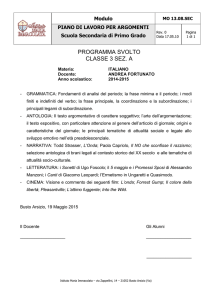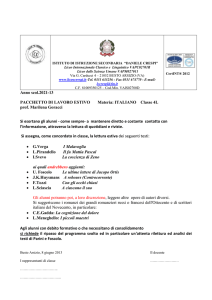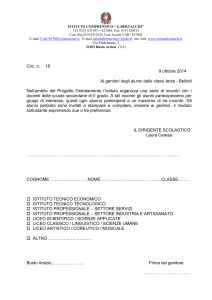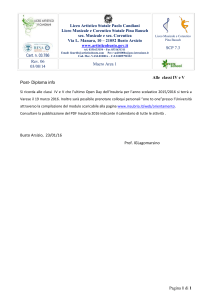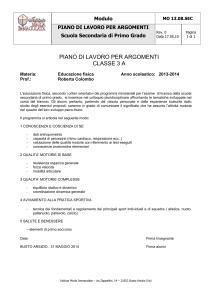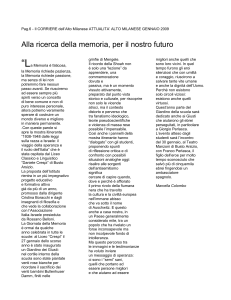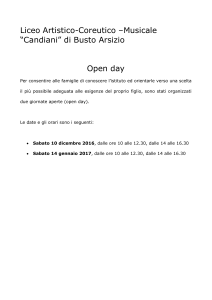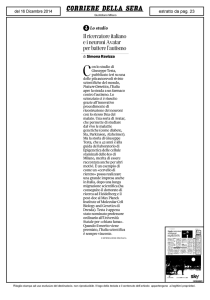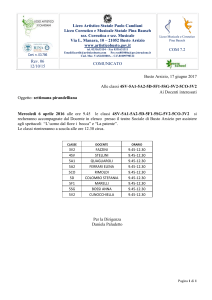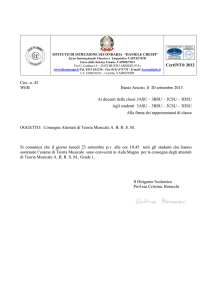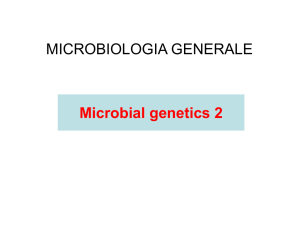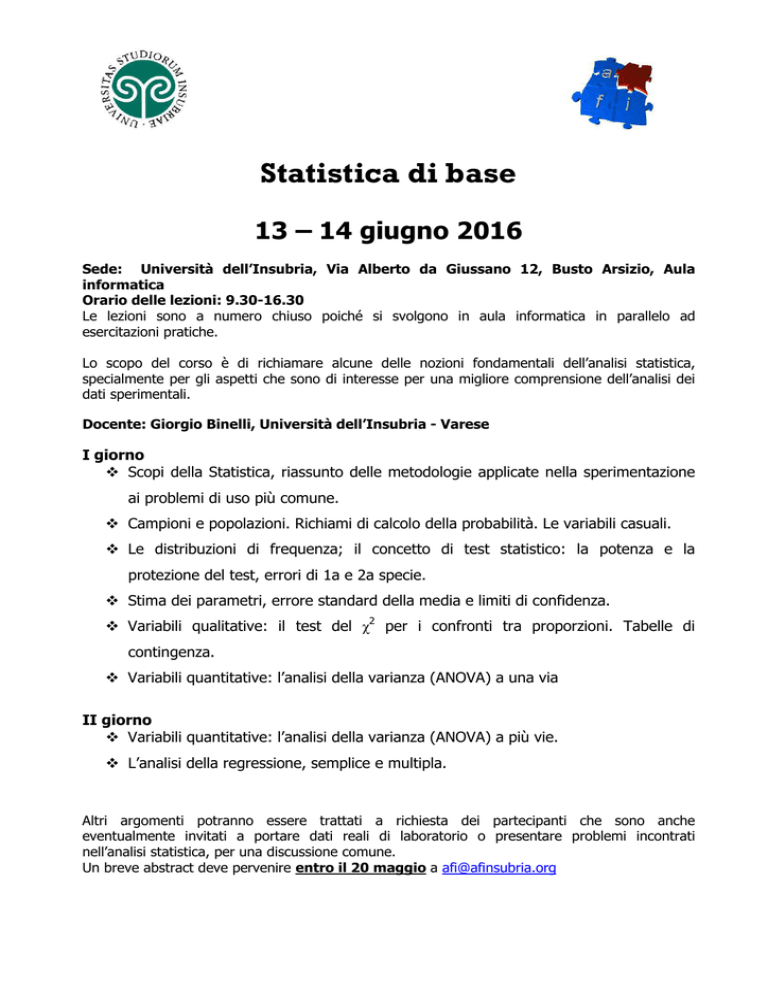
Statistica di base
13 – 14 giugno 2016
Sede: Università dell’Insubria, Via Alberto da Giussano 12, Busto Arsizio, Aula
informatica
Orario delle lezioni: 9.30-16.30
Le lezioni sono a numero chiuso poiché si svolgono in aula informatica in parallelo ad
esercitazioni pratiche.
Lo scopo del corso è di richiamare alcune delle nozioni fondamentali dell’analisi statistica,
specialmente per gli aspetti che sono di interesse per una migliore comprensione dell’analisi dei
dati sperimentali.
Docente: Giorgio Binelli, Università dell’Insubria - Varese
I giorno
Scopi della Statistica, riassunto delle metodologie applicate nella sperimentazione
ai problemi di uso più comune.
Campioni e popolazioni. Richiami di calcolo della probabilità. Le variabili casuali.
Le distribuzioni di frequenza; il concetto di test statistico: la potenza e la
protezione del test, errori di 1a e 2a specie.
Stima dei parametri, errore standard della media e limiti di confidenza.
Variabili qualitative: il test del χ2 per i confronti tra proporzioni. Tabelle di
contingenza.
Variabili quantitative: l’analisi della varianza (ANOVA) a una via
II giorno
Variabili quantitative: l’analisi della varianza (ANOVA) a più vie.
L’analisi della regressione, semplice e multipla.
Altri argomenti potranno essere trattati a richiesta dei partecipanti che sono anche
eventualmente invitati a portare dati reali di laboratorio o presentare problemi incontrati
nell’analisi statistica, per una discussione comune.
Un breve abstract deve pervenire entro il 20 maggio a [email protected]
Giorgio Binelli, PhD, Associate Professor of Genetics, Department of Theoretical and Applied Sciences,
University of Insubria.
Education: 1977-1981, M.S. in Biological Sciences, graduated on Dec. 9th, 1981, University of Milano;
1985-1988, Ph.D. in Cellular and Molecular Biology, University of Milano.
Career: 1983-1989, research activity on different grants in Plant Genetics at the University of Milano;
1990-1998, Research Associate in Genetics, University of Milano; 1994-1998, Lecturer in Genetics,
University of Sassari; 1998-2001 Associate Professor of Genetics, University of Sassari; 2001 – present:
Associate Professor of Genetics, University of Insubria.
RESEARCH INTERESTS: - Analysis on the extent of haplo-diploid gene expression in maize and studies
on gametophytic selection. Isozyme markers were used as tools in the period when isoenzymatic analysis
was state of the art in the field. - Studies on high temperature stress in both plant and pollen, in maize and
Arabidopsis. The analyses were performed on the induced synthesis of Heat-Shock Proteins. - Quantitative
genetics. Use of molecular markers for the study of the genome structure of sorghum and maize and to
localise useful genes in several organisms (maize, mouse, man). The new molecular techniques were
applied to answer basic questions in classical genetics and quantitative genetics: genetic maps were built
for sorghum and maize and used to localise the genetic factors controlling quantitative traits. Some of the
results obtained have been among the first obtained in the respective fields.
- Population genetics of forest trees. Neutral genetic molecular markers were utilised to build the first
published genetic map and to estimate the amount of genetic variability in Norway spruce. The same tools
have been used to conduct large-scale surveys about the distribution of the genetic variability among
different Italian populations of the same species and among Mediterranean populations of Phoenician
Juniper, with a special emphasis on the conservation aspects of the work. - Conservation Genetics. Studies
on different Quercus species of ecological and economical interest based on both population genetics and
phylogeographic approaches. In the same field, studies on endemic plant species of Sardinia and
associated islands. Studies on the hybridisation between Ulmus species.
- Molecular phylogenetics and evolution. Utilisation of numerical taxonomy and phylogenetic methods for
the analysis of different genotypes of the Hepatitis B and C viruses (HBV and HCV). The main purpose of
the research is to assess whether a correlation exists between different viral genotypes and the degree of
the hepatitis-cirrhosis-hepatocellular carcinoma progression. The tools developed have been of help in the
reconstruction of an outbreak of hepatitis B and in the tracking of an old infection event, which led to the
identification of the source. The same instruments have been applied to the study on the effect of selection
on selected Vertebrate genes. Recently, the use of advanced phylogenetic reconstruction methods has also
helped to shed light on paleonthological issues.
He is an author of 53 papers in peer-reviewed international journals, in addition to contributions to
books, research reports and to international meetings.
Come arrivare
In treno: raggiungere le stazioni di Busto Arsizio (da Milano Porta Garibaldi o Passante Ferroviario) o Busto
Arsizio Nord (da Novara, Milano Cadorna, Milano Bovisa, Milano Centrale o Milano Porta Garibaldi).
Orari consultabili su http://www.fsitaliane.it/. Seguire le indicazioni della mappa; A: Stazione Busto
Arsizio; B: sede della scuola; C: Stazione Busto Arsizio Nord.
In auto: uscire a Busto Arsizio (A8) o Marcallo Mesero (A4, poi superstrada per Malpensa e uscita
Vanzaghello) e raggiungere il parcheggio di Piazzale dei Bersaglieri (non disponibile il giovedì e il sabato).
Coordinate GPS 45.607621, 8.857178.
In aereo: per chi vola a Milano Linate è consigliabile raggiungere Milano Centrale e seguire le indicazioni
per chi viaggia in treno. Percorrenza 65 minuti circa.
È consigliabile volare su Milano Malpensa e prendere il Malpensa Express dal Terminal 1 e scendere a
Busto Arsizio Nord. Orari consultabili su www.trenord.it/. Percorrenza 9 minuti.
Indicazioni per il pernottamento:
A 10-15 minuti a piedi:
Hotel Ortensia (***) http://www.hotelhortensia.it/
Albergo Mazzini (**) 0331-631715 http://www.paginegialle.it/albmazzini
Raggiungibili solo con mezzo proprio:
Hotel MO.OM (****) http://www.moomhotel.com/
Hotel Pineta (****) http://pineta.lerobinie.com/
Modalità di partecipazione
Entro il 13 maggio 2016
Dopo il 13 maggio 2016
€ 200 +IVA*
€ 300 +IVA*
*In caso di esenzione IVA (22%), allegare documentazione.
Informazioni, CONDIZIONI GENERALI e modulo di iscrizione: www.afinsubria.org.
Pagamento da effettuare con bonifico bancario dopo la conferma dell’attivazione del corso da parte
della Segreteria Organizzativa:
Codice IBAN IT23X0558450233000000000229
CIN X
Beneficiario: D’Urso & Fanali S.r.l. - AFInsubria
Causale: Nome Cognome Statistica giugno 2016
Segreteria scientifica e organizzativa:
Dott.ssa Gabriella Fanali, Alta Formazione Insubria.
Cell. 338 9636719 e-mail: [email protected]
http://www.afinsubria.org
Con il Patrocinio di:

